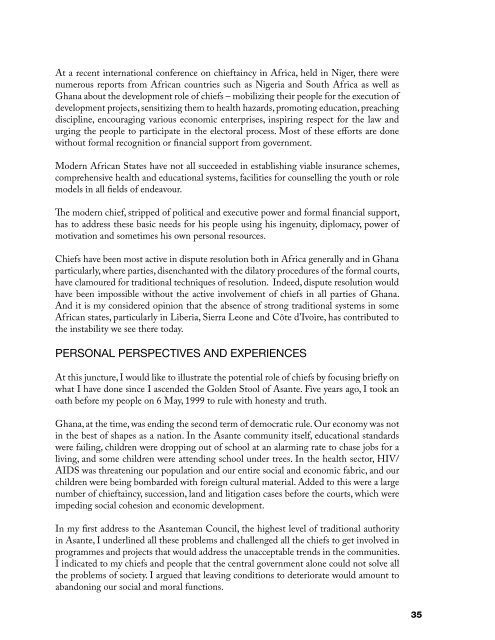Relevance of - United Nations Economic Commission for Africa
Relevance of - United Nations Economic Commission for Africa
Relevance of - United Nations Economic Commission for Africa
Create successful ePaper yourself
Turn your PDF publications into a flip-book with our unique Google optimized e-Paper software.
At a recent international conference on chieftaincy in <strong>Africa</strong>, held in Niger, there were<br />
numerous reports from <strong>Africa</strong>n countries such as Nigeria and South <strong>Africa</strong> as well as<br />
Ghana about the development role <strong>of</strong> chiefs – mobilizing their people <strong>for</strong> the execution <strong>of</strong><br />
development projects, sensitizing them to health hazards, promoting education, preaching<br />
discipline, encouraging various economic enterprises, inspiring respect <strong>for</strong> the law and<br />
urging the people to participate in the electoral process. Most <strong>of</strong> these ef<strong>for</strong>ts are done<br />
without <strong>for</strong>mal recognition or financial support from government.<br />
Modern <strong>Africa</strong>n States have not all succeeded in establishing viable insurance schemes,<br />
comprehensive health and educational systems, facilities <strong>for</strong> counselling the youth or role<br />
models in all fields <strong>of</strong> endeavour.<br />
The modern chief, stripped <strong>of</strong> political and executive power and <strong>for</strong>mal financial support,<br />
has to address these basic needs <strong>for</strong> his people using his ingenuity, diplomacy, power <strong>of</strong><br />
motivation and sometimes his own personal resources.<br />
Chiefs have been most active in dispute resolution both in <strong>Africa</strong> generally and in Ghana<br />
particularly, where parties, disenchanted with the dilatory procedures <strong>of</strong> the <strong>for</strong>mal courts,<br />
have clamoured <strong>for</strong> traditional techniques <strong>of</strong> resolution. Indeed, dispute resolution would<br />
have been impossible without the active involvement <strong>of</strong> chiefs in all parties <strong>of</strong> Ghana.<br />
And it is my considered opinion that the absence <strong>of</strong> strong traditional systems in some<br />
<strong>Africa</strong>n states, particularly in Liberia, Sierra Leone and Côte d’Ivoire, has contributed to<br />
the instability we see there today.<br />
PERSONAL PERSPECTIVES AND EXPERIENCES<br />
At this juncture, I would like to illustrate the potential role <strong>of</strong> chiefs by focusing briefly on<br />
what I have done since I ascended the Golden Stool <strong>of</strong> Asante. Five years ago, I took an<br />
oath be<strong>for</strong>e my people on 6 May, 1999 to rule with honesty and truth.<br />
Ghana, at the time, was ending the second term <strong>of</strong> democratic rule. Our economy was not<br />
in the best <strong>of</strong> shapes as a nation. In the Asante community itself, educational standards<br />
were failing, children were dropping out <strong>of</strong> school at an alarming rate to chase jobs <strong>for</strong> a<br />
living, and some children were attending school under trees. In the health sector, HIV/<br />
AIDS was threatening our population and our entire social and economic fabric, and our<br />
children were being bombarded with <strong>for</strong>eign cultural material. Added to this were a large<br />
number <strong>of</strong> chieftaincy, succession, land and litigation cases be<strong>for</strong>e the courts, which were<br />
impeding social cohesion and economic development.<br />
In my first address to the Asanteman Council, the highest level <strong>of</strong> traditional authority<br />
in Asante, I underlined all these problems and challenged all the chiefs to get involved in<br />
programmes and projects that would address the unacceptable trends in the communities.<br />
I indicated to my chiefs and people that the central government alone could not solve all<br />
the problems <strong>of</strong> society. I argued that leaving conditions to deteriorate would amount to<br />
abandoning our social and moral functions.<br />
35
















